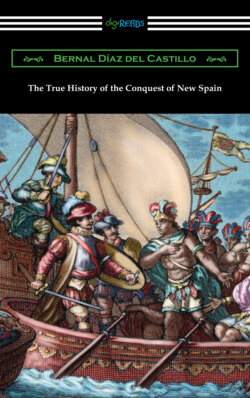Читать книгу The True History of the Conquest of New Spain - Bernal Diaz del Castillo - Страница 64
На сайте Литреса книга снята с продажи.
CHAPTER LVIII.
ОглавлениеHow we came to the resolution of marching to Mexico, and of destroying all our vessels, which was done with the sanction and by the advice of all Cortes’ true adherents.
While preparations were going on at Sempoalla for our march into the interior numerous consultations were held with Cortes respecting everything connected with it, we, his trustworthy adherents, proposed that all the vessels should be run on shore, in order at once to cut off all possibility of further mutiny, when we should have advanced far into the interior of the country. In which case, likewise, the pilots and sailors would be of greater use to us than by idling their time away in the harbour. I am well aware that the idea of destroying our vessels originated with Cortes himself, and that he merely shoved it on our shoulders for this reason, that if payment for the vessels should be demanded of him, he could throw the blame on us, and say that all was done at our own request; so that we both individually and collectively should have to assist in repaying the damages. This resolution was immediately adopted, and Cortes ordered the alguacil-major, Juan de Escalante, a young man of very great courage, and who was a close adherer to him, utterly hating Diego Velasquez because he had neglected to give him any considerable commendary in Cuba, to take all the anchors, ropes, sails, in short everything that might be of use to us out of the vessels, and run the latter all on shore, with the exception of the boats. The pilots, the old ships’ masters, and those seamen who were unable to make the campaign with us, were to remain behind in the town, and employ themselves in catching fish with our two drag-nets in the harbour, where the former were in great abundance.
Juan de Escalante punctually obeyed these orders, and arrived in Sempoalla with an additional company formed of the sailors, of whom several became very excellent soldiers. The next thing Cortes did was to call all the caziques of the mountain tribes together, who had revolted from Motecusuma, and formed an alliance with us. He gave them to understand that they were to assist in the building of the church, the fortresses, and houses of our new town. “This man,” continued he, taking Juan de Escalante by the hand, “is my brother; him you must obey in everything; and to him you must apply if you require assistance against the Mexicans. He will himself at all times march out in your defence.” The caziques in reply, said, “They were ready to obey him in everything,” and perfumed Juan de Escalante after their fashion, which I can still well remember he unwillingly submitted to. For the rest he was a man you could trust in all matters, and who fully possessed the confidence of Cortes; for which reason the latter intrusted him with the command of the town and harbour, as one in whom he could place implicit reliance, in case, during his absence, Diego Velasquez should set anything on foot against him.
Gomara here relates, that Cortes ordered the vessels to be sunk, and that he did not disclose his intentions to us of visiting the great Motecusuma himself at Mexico. But we Spaniards are, indeed, not the people who require so much pressing to move forward, or who desire to sit quietly down in a place where neither advantage nor military honour is to be gained. Gomara also says, that Pedro de Irico was the person left behind in command of Vera Cruz. This, however, is quite erroneous, for it was Juan de Escalante who was appointed commander and alguacil-major of New Spain. Pedro de Irico, indeed, would scarcely have been intrusted with the command of a company, much less, therefore, with such an important post. Nothing should be given to a man that does not belong to him, and nothing should be taken from him to which he is entitled.
